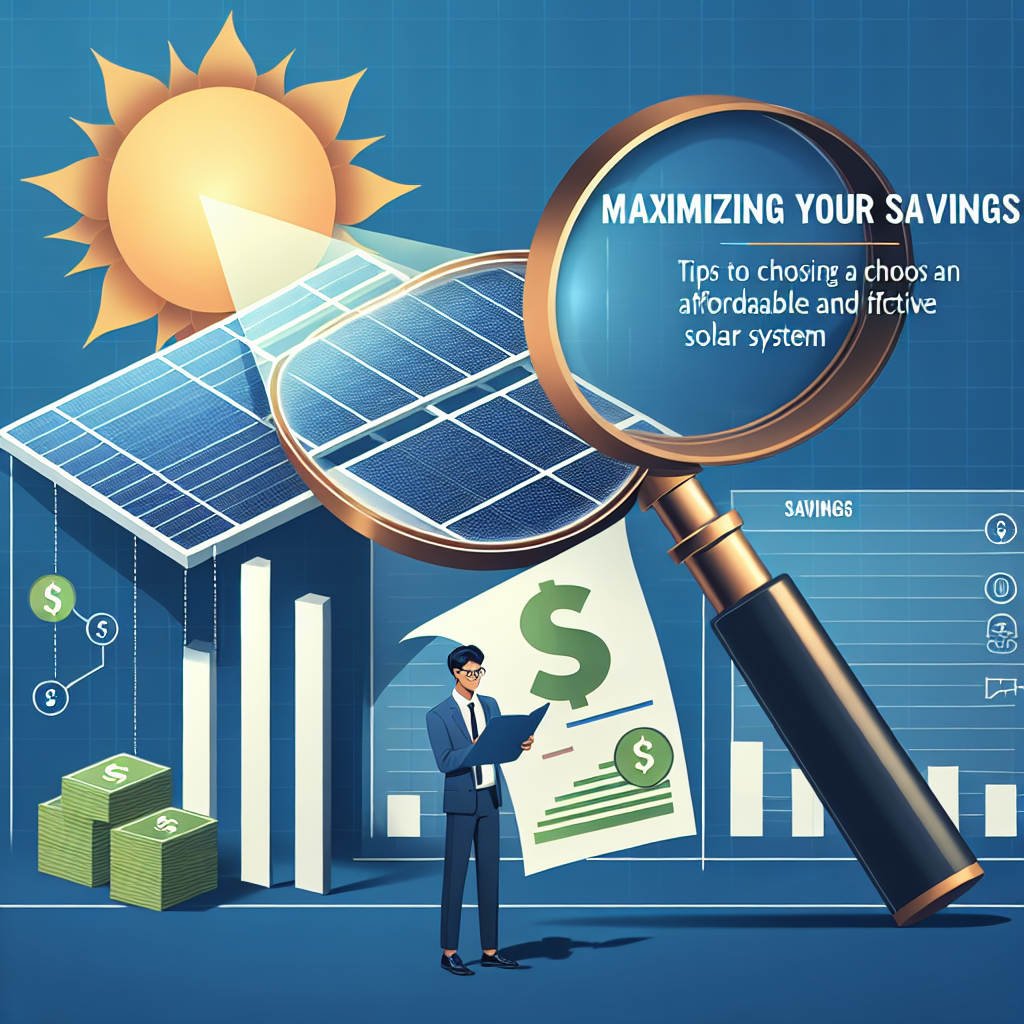In today’s world, the quest for sustainable energy solutions is more pressing than ever. With the rising costs of electricity and the increasing impact of climate change, many homeowners are turning to solar energy for a cleaner, more economical alternative. However, choosing the right solar system can be daunting. Here are some essential tips for maximizing your savings while ensuring efficiency and effectiveness.
Understanding Your Energy Needs
Before diving into the world of solar systems, assess your energy consumption. Analyzing past utility bills for at least a year will provide you with a clear picture of your average energy use. This evaluation helps you determine how much power you’ll need from your solar system, allowing you to make informed decisions that align with your budget.
Get Familiar with Solar Terminology
To navigate the solar market effectively, familiarize yourself with some basic terminology. Terms like kilowatts (kW), kilowatt-hours (kWh), photovoltaic (PV), and grid-tied systems can help you understand what you’re investing in. Also, consider learning about net metering, which can significantly enhance your long-term savings by crediting your account for excess solar energy fed back to the grid.
Solar System Types: Choosing What Works for You
Grid-Tied Systems
Grid-tied solar systems are the most common type for residential properties. They are connected to the utility grid, allowing you to draw electricity from the grid when your solar panels aren’t producing enough power, such as during cloudy days or at night. This setup is often the most cost-effective choice, and it benefits from net metering.
Off-Grid Systems
If you live in a remote area or prefer complete energy independence, an off-grid system may be ideal. However, these systems can be more expensive due to the need for battery storage. Before opting for this route, ensure it fits your financial and lifestyle needs.
Hybrid Systems
Hybrid systems combine elements of both grid-tied and off-grid systems. They offer the advantages of battery storage while staying connected to the grid. This can be a great compromise for those wanting to reduce their dependence on traditional power sources without completely severing ties.
Conduct Thorough Research
Compare Providers
Not all solar providers offer the same pricing or quality of service. Research multiple companies and read customer reviews to identify reputable contractors. Look for providers that offer transparent pricing, good warranties, and understand local regulations.
Request Multiple Quotes
Once you’ve found a few potential solar providers, request detailed quotes. This allows you to compare not only the upfront costs but also the specific equipment proposed, installation fees, and the expected energy production from each system.
Check for Certifications
Ensure that the solar company you choose is certified by organizations such as the North American Board of Certified Energy Practitioners (NABCEP). Certifications can be a good indicator of the company’s quality of work and commitment to best practices.
Financing Options: Finding What Fits Your Budget
Solar Incentives and Rebates
One significant benefit of installing solar systems is the various incentives available. Check for state and federal tax credits, rebates, or local programs that could substantially lower your installation costs. The Federal Investment Tax Credit (ITC) offers a percentage back on your investment, making solar more affordable.
Consider Solar Loans or Leases
If upfront costs are a concern, consider financing options like solar loans or purchasing a solar lease. Solar loans typically allow you to own the system outright, while leases enable you to pay a monthly fee. Be sure to calculate your potential savings against any recurring payments to ensure these options make financial sense.
Optimize Your Solar System’s Performance
Regular Maintenance
To ensure your solar system continues to perform at peak efficiency, invest in regular maintenance. Keeping the panels clear of debris and scheduling periodic professional check-ups can prolong the life of your system and maximize your savings in the long run.
Monitor Your Energy Production
Utilize monitoring software that tracks your system’s energy production. Many solar companies offer apps or online portals that provide real-time data about your energy output. This information allows you to identify any issues early on and adjust your energy habits accordingly.
Conclusion: Embracing a Sustainable Future
Investing in a solar energy system can be a game-changer for homeowners looking to save money while supporting a greener planet. By understanding your energy needs, researching and comparing providers, exploring financing options, and maintaining your system, you can maximize your savings and enjoy the benefits of solar energy for years to come.
Making the switch to solar is not just about saving money—it’s about taking a step towards a healthier environment for future generations. With informed choices and a little patience, you can harness the power of the sun and light up your home’s energy future.


